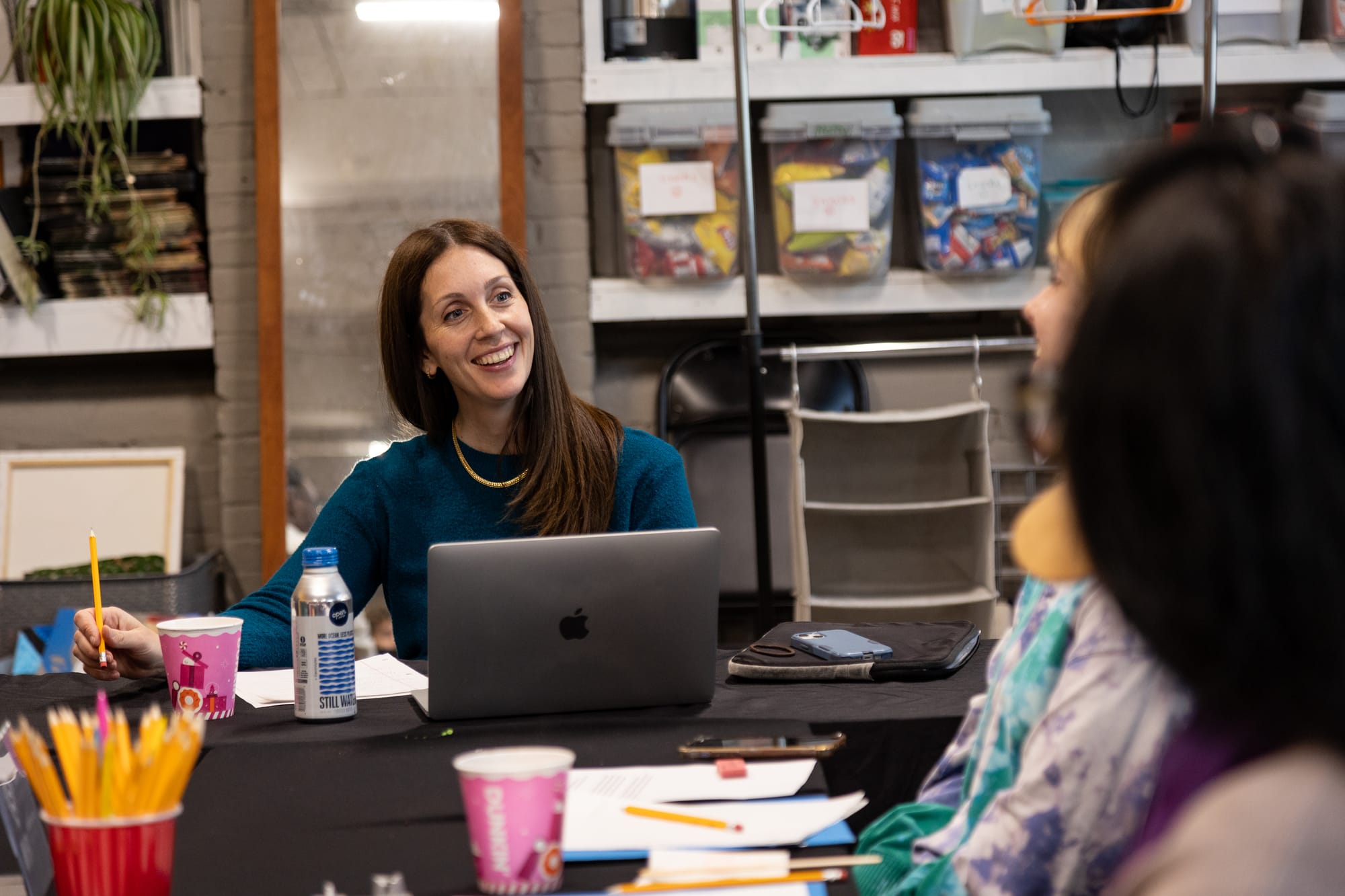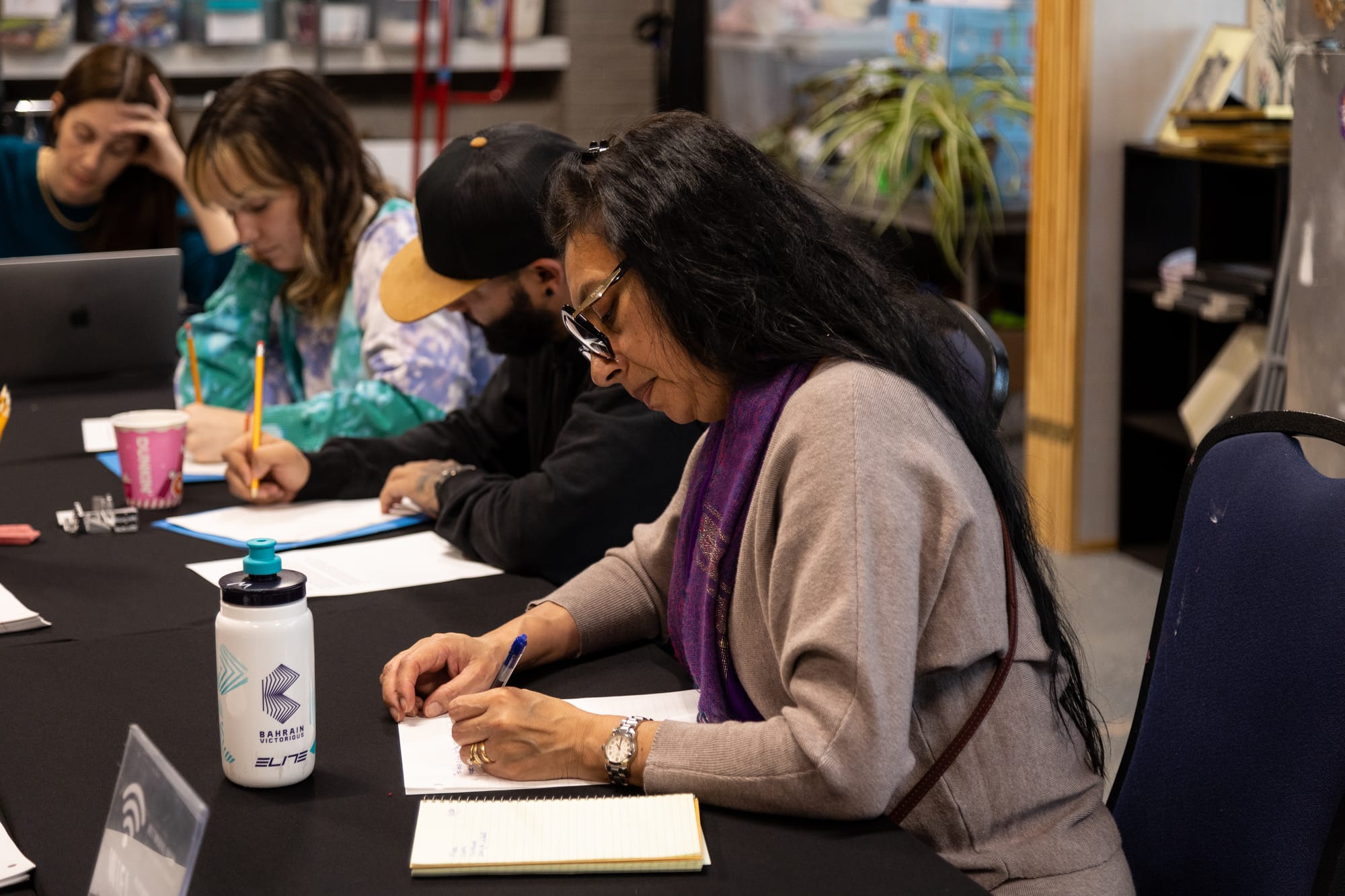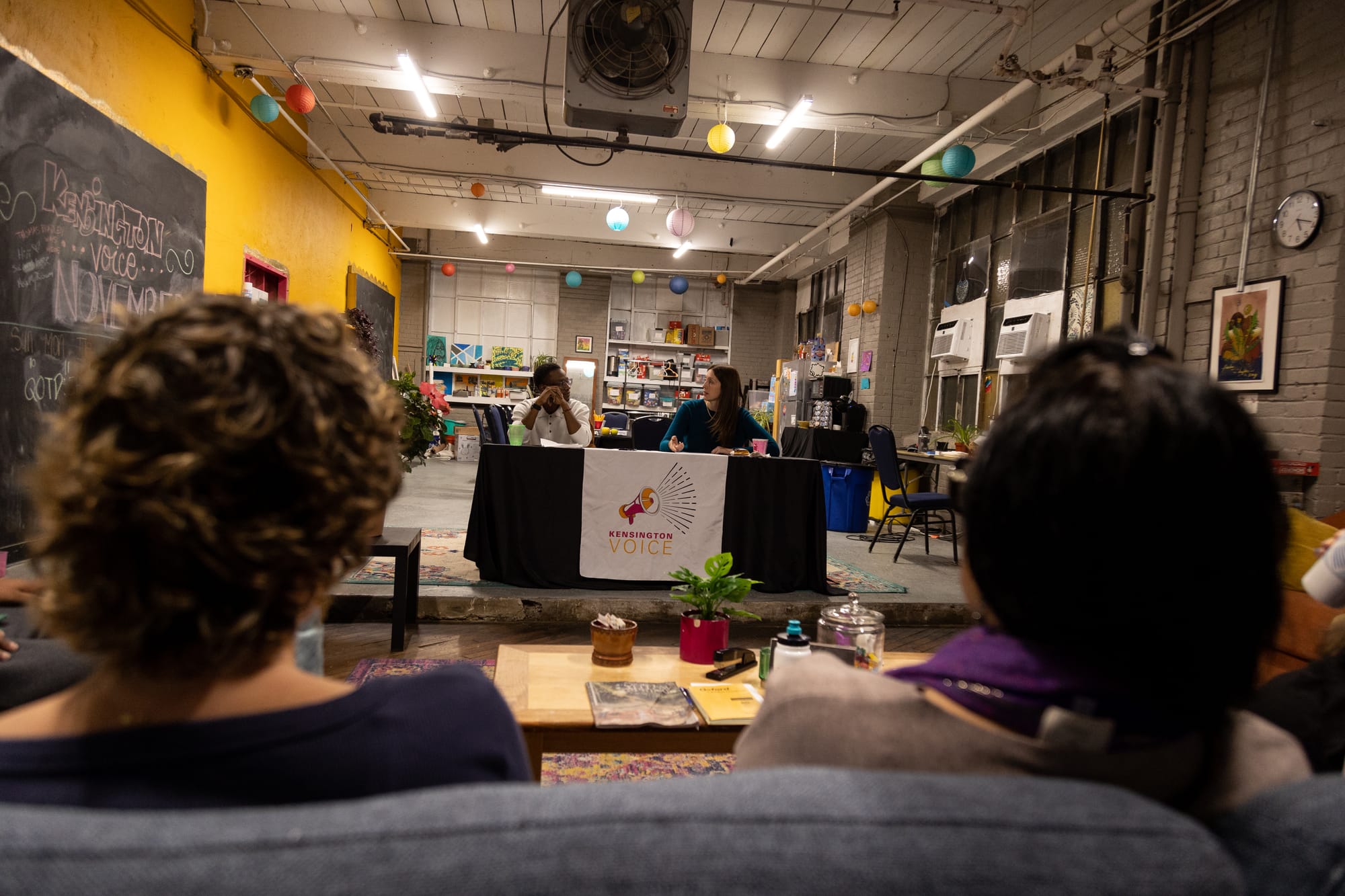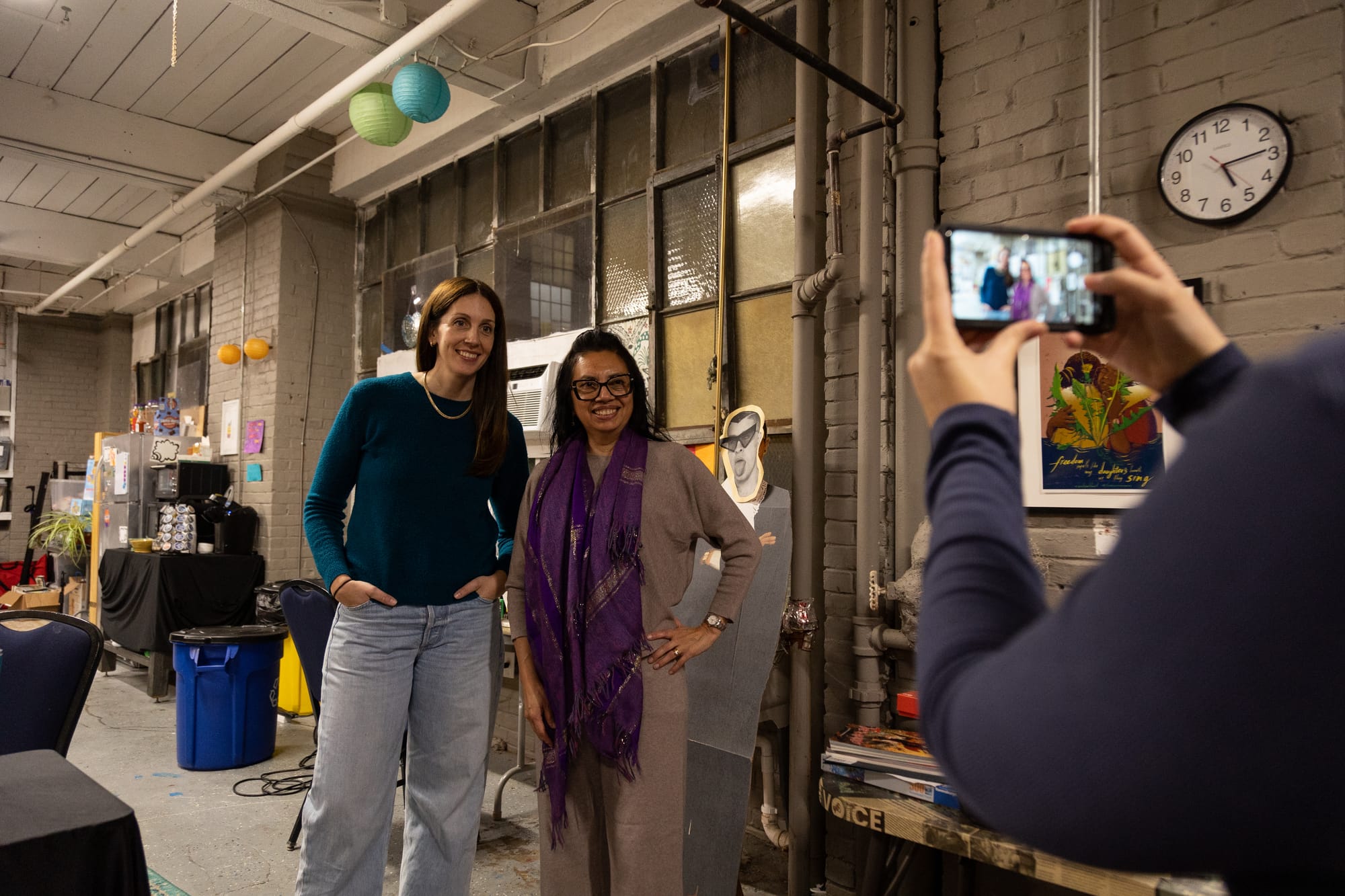Philly launches $600K emergency grants to aid small grocers hit by SNAP shutdown
Applications are open through Dec. 31 on the Merchants Fund website. Priority will go to small, locally owned retailers operating in low-income neighborhoods.
The Monday night event involved attendees writing with Moore and learning more about her and her current, past, and upcoming projects.

On Monday, Nov. 11, Kensington Voice partnered with New York Times best-selling novelist Liz Moore to host “The Power of Your Novel,” a writing workshop and post-workshop Q&A event.
Moore is the author of novels such as “The God of the Woods,” “Heft,” and “Long Bright River,” a book set in kensington about the relationship of two sisters on opposite sides of the opioid crisis.
Community members and fans joined the event and indulged in an evening of writing and learning more about her and her upcoming TV series based on her book, “Long Bright River,” which will air on Peacock in 2025.
“Kensington is a community that has affected me profoundly, and it's very meaningful for me to return to the neighborhood as often as I can,” Moore wrote in an email.

In addition to her novels, Moore is the associate professor and director of the M.F.A. program in creative writing at Temple University and a mother of two young children. She received her undergraduate degree in English from Barnard College and her M.F.A. in fiction writing from Hunter College.
Having lived in Framingham, Massachusetts, New York, and Philadelphia, the settings she uses in her books have always been influenced by the places she’s lived.
“Place is a huge inspiration for me,” Moore said. “There's something about living in a place that really lets you get its texture.”

The 90-minute event was divided into two parts: a 45-minute writing workshop led by Moore, followed by a moderated Q&A with me, Khysir Carter.
During the workshop, Moore led a writing activity centered around three prompts: a place you’ve been to that you’ll never be again, a person you’ll never see again, and a problem that includes those two prompts. Participants had seven minutes to work on each prompt and were offered an opportunity to share with the rest of the group what they wrote. Between writing activities, Moore read her favorite quotes and examples of places, people, and problems from other writers. When the workshop ended, the group was asked about their experiences. One participant shared how they appreciated the “living silence” that filled the room as everyone worked on the prompts.

Teaching at Temple. Parenting my kids: a five-year-old and an eight-year-old. One's in kindergarten, and one's in third grade. I read a lot. I like to play music. My kids are now learning music, and I study Italian. I learned it late in life, and now I have become obsessed with getting as good at Italian as I can possibly get.
Places have always really inspired me. I grew up in a town called Framingham in Massachusetts. I went to college and grad school in New York, and then I moved to Philadelphia 15 years ago. I also have a strong connection to upstate New York because my mom's family comes from there. And so, for everything I've ever written, I've set in a place where I've really lived.
In terms of other writers that I've read and who have been inspirational for me, they, too, are often writers who write in a very strong way about place. Edward P Jones was a very formative influence on me. He wrote a series of short stories about Washington, DC, that were kind of interconnected only in the sense that they all took place there, and all of his characters could have been friends but weren't. It was like he picked a neighborhood and wrote about that one neighborhood and all the people in it. I want to make the case that you could do the same thing about any neighborhood in Philadelphia. I haven't done that yet, but if anybody, especially people who were born and raised here, could absolutely do that. Actually, there is a writer who's doing that, whose name is Sally Solomon; she wrote a collection called “Get Down” about West Philadelphia that is incredibly good. So, yeah, any writer writing in a very strong way about places was like an early inspiration for me.
I am a co-writer on “Long Bright River,” which means I'm one of six writers in a room who wrote scripts for it, and it's been fascinating. I guess that's the best word for it. I feel like I've gotten a college degree in television production. There are so many things that I did not know going into it that I now know for better or worse. I think one thing I can safely say is that there are a lot of people on the project who are extremely good at their jobs and who are extremely talented. Our cast has been incredibly invested. They've done their research. They've really, really grown. Some of them actually have spent a lot of time in Kensington and have really gotten to know the neighborhood and the organizations that I love in Kensington, including St Francis Inn, which is near and dear to my heart because that's the first place that I began leading writing workshops in the neighborhood.
I had no idea what a production designer did before. I could speculate, but seeing the care with which our production designer, Amy Williams, researched all the places that ended up becoming part of the series was very inspiring, and I think she knocked it out of the park. I'll be honest with you: the difficult part of making a series from a book is that when you write fiction, you are like the commander of the universe, and you can make every single choice. As somebody who loves control, I feel that it is like my safe place. With a series, you're one of 120 voices or more making a thing. And so the beauty is that you can elevate one another, and the difficulty of that is sometimes you lose creative battles, right? Like I might want one thing, and somebody else might want another, and I am not, in fact, the boss of the series, and so I might lose that battle. But I think it's an important skill to have as a human to be able to hear other voices in a room and to say, ‘Okay, you know, I wrote the book, but you have way more experience making a television show than I do, and so I'm actually going to defer to you on this,’ which is what I tried to do when I felt it was appropriate.
I think just getting to know a new job. We were saying that it's never too late to do anything. I am 41, and I had never worked in television until I was 39,37, maybe?
You don't have to start in an industry to eventually make your way into it and learn it really well. So that's been cool.
I would say developing a practice that lets you write regularly is the most important part of being a writer. I think everybody has different circumstances in life. There are going to be moments in your life when you are experiencing hardship that precludes writing. You can't write in those moments, and that's okay. But at your baseline, whatever that is for you, you need to find a way to develop a practice that is, if not daily, then at least regular. Maybe it's every Saturday. Maybe it's every Saturday and Wednesday morning.
I try to write every weekday morning. Because I have young kids and other jobs, I find that it's very important for me to go from sleeping to writing. And so I set my alarm for 5:30 a.m., and I go from sleeping to writing. And when my kids wake up, I'm with them. That lets me, at least five days a week, get words on the page. And that's that's something that I've come to depend on, also for my emotional well-being. It's very therapeutic for me. When you're in moments where you can write, make it a regular practice.

I think, honestly, a love of reading first. I think whatever you're consuming, you want to try to emulate, and so I loved reading. I was a voracious reader as a kid. And sooner or later, you try to see if you can do that thing too, whether it's visual art or math, or whatever you're consuming, you kind of try to experiment with putting out. And so that was my path into writing. I started keeping a journal as a kid. I wrote pretty regularly in that journal. I was drawn to poetry at first, and then I didn't really start writing fiction till I got to college, but once I was there, I just found that I really enjoyed it, and I kind of haven't looked back.
I would say, read very broadly. Read beyond just what you're what you think you're interested in. And I would say know that frustration is part of the process. So if you find yourself with what is known as writer's block, sometimes, all that means is that you need to do a little bit of free writing, or you need to remove the editorial side of your brain for a moment, just so you can get words on the page. Words on the page build upon themselves. Just committing words to paper builds confidence, I think, and is an act of writing, even if you don't like what you're writing. So, you know, I think just try to accumulate words on a page. It sounds so basic, but that's what writing is, and that's what a writer does.
When I was younger, I wrote almost exclusively by hand. And sometimes, if I'm having trouble, if I'm experiencing that sensation of feeling uninspired, I'll return to writing by hand. But normally I write on my computer these days.
‘I didn't,’ is the actual answer. I got my MFA, and I feel like I spent half of my MFA program, just being mad at myself for not writing more. Honestly, it wasn't until I graduated from the MFA program and just didn't have those guard rails in place anymore. It was a turning point for me, and I was like, 'I could very easily just never write again if I wanted to.' And so, I had to develop the stamina to write consistently. My first attempt at doing that was kind of like a fake contract I made with another writer friend, where we agreed to write at the same time every day, and this reminds me of the idea of writing in community even when you're far apart. We would separately write at the same time every day, and we would email each other just the word 'done,' and that alone kind of held me accountable until I was able to develop the self-motivation to do it on my own.
So, I have many years of practice in answering this question. The agreement that I've reached with myself is that I say my own family has a lot of addiction in it, and that's about all that I say out of concern for their privacy. But that is a true fact. Also, living in Philadelphia, I became very interested in the community of people who are sort of like working on the ground with communities of people experiencing addiction. And so I began going into Kensington first to write nonfiction about Kensington, and I interviewed a lot of people who are experiencing addiction who are doing sex work to support their addiction. And just talking to people on the street was really moving. Getting their stories, starting to understand how much they had in common with one another.
Often, it was quite a similar story, where this was in 2009 I first went to the neighborhood, and it was, you know, Oxycontin was invented in ‘96 and so often when the people that were growing up prior to 2009 when I met them, they did not have the same information that we now have about the addictive potential of those pills. And so many of them started using pills recreationally, not believing that they had the addictive potential, which, of course, now we know they do.
Now I think it's a different issue. I think the majority of people understand how potentially addictive those pills are, but many people are still experiencing generational trauma from having been raised by a person in addiction. So it's a really profound cycle that keeps happening. So, speaking with people in Kensington was a source of inspiration.
I also did research with the police, and I did a ride-along in probably 2017 or 2018 when I was in the heart of writing the book, just to get information on police procedure: what is it like to be a patrol cop from morning to night?
It was my interest to interrogate the ways in which there are systemic failings within the Philadelphia Police Department and in general policing in the United States. And that's something that I sort of brought to the series as well.
To learn more about Moore and her novels, find her website here. You can also follow her on Instagram to keep up with what she’s working on, on and off the pen and page.
We have a paid opportunity for people interested in publishing work on our website. Our community "Voices" section is for community members to submit written work (op-eds, poems, essays, photo essays, etc) to us and get paid for it. If interested, contact khy@kensingtonvoice.com to learn more.
Free accountability journalism, community news, & local resources delivered weekly to your inbox.